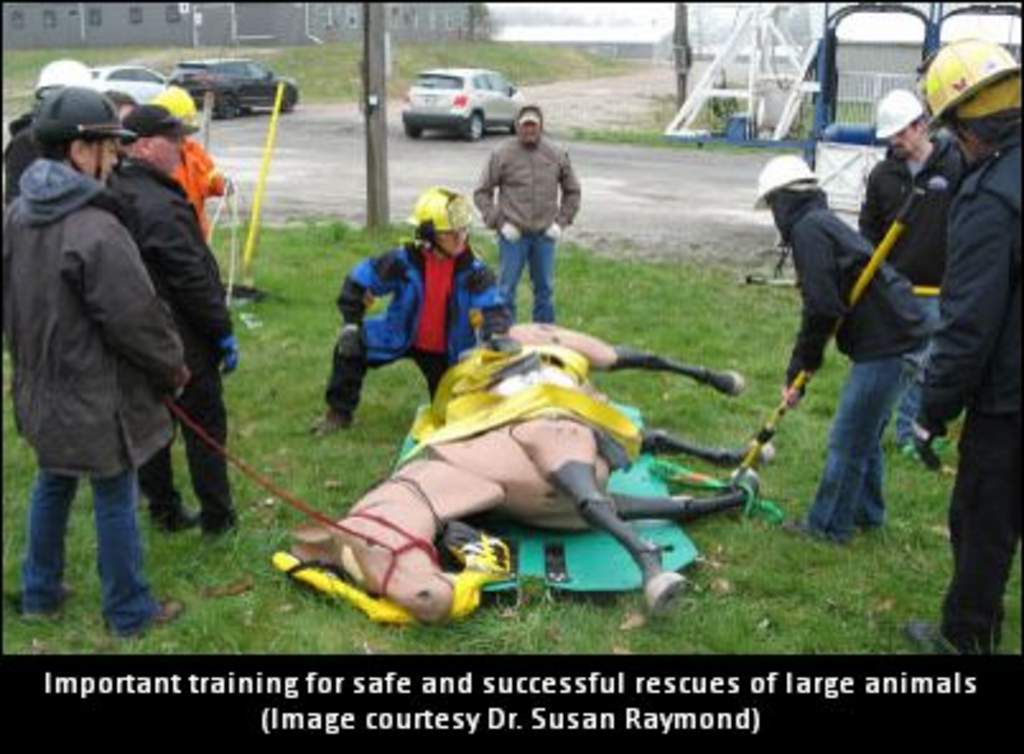Equine Rescue Course A Success

What do you do if a horse goes down in a racetrack starting gate or other confined space like a horse trailer or stall? How many resources and phone calls are needed to extricate a large animal from any potentially dangerous scenario?
"If you have failed to plan, unfortunately the outcomes can be dire for both the animal in the unpredictable situation and the well-intentioned human attempting to come to the rescue," says Rebecca Gimenez of Technical Large Animal Emergency Rescue Inc. (TLAER).
Thanks to funding from both Grand River Agricultural Society and the Ontario Ministry of Agriculture, Food and Rural Affairs and support from Woodbine Entertainment Group, a specialized offering of Fire Prevention and Emergency Rescue Training was held specifically for over 40 members of the Ontario horse racing industry. Hosted by Equine Guelph on April 25 and 26, 2017 at Mohawk Racetrack in Campbellville, Ont., this important training raised awareness and increased preparedness for all attendees, from all three sectors of the racing industry - Thoroughbred, Standardbred and Quarter Horse.
"It was an incredible learning experience to have Dr. Rebecca Gimenez (TLAER Inc.), a respected expert in this field world-wide, as well as a practicing fire fighter and crew, travel here to deliver this course," said Ralph Wilson of Heartland Farm Mutual.
Participants learned what to do and what not to do during real-life and in-depth presentations. This was followed by hands-on exercises which included working with ‘Rusti,’ the Rescue Horse mannequin. Limbs and tails are not handles! This was a clear message delivered as human to horse comparisons were made.
"The course was full of great information I can use and pass on," said participant Kathie Wilkinson and Quarter Horse Program Coordinator. "The experience of racetrack staff in describing real-world situations, and their availability to answer questions was very helpful."
A strong emphasis on fire prevention and evacuation procedures resonated with all who attended the training. Identifying and dealing with all sorts of hazards, from fire prevention and safety to containment concerns were part and parcel of the course.
Throughout the two-day intensive emergency rescue training, the focus was on best practices specific to: incidents involving starting gates, starting cars, loose horses and on-track injuries. Participants worked through mocked up scenarios of trailer and stall incidents, working with the incident command system.
"The introduction of this type of training, customized for the racing industry is a great investment to enhance the health and welfare of countless race horses (Thoroughbreds, Standardbreds and Quarter Horses) in the horse racing heartland of Ontario – as well as the safety of the people who are handling them. The Ontario horse racing industry is committed to the highest level of animal welfare, fire prevention practices and emergency response preparedness," said Hugh Mitchell, President & Chief Executive Officer of Western Fair District. "With this training initiative in place for the horse racing industry, more critical mass will be added in the province for ongoing instruction on how to safely and collaboratively deal with incidents involving horses as well as other large animals."
"This type of emergency rescue training is essential for first responders, and anyone involved with transporting livestock, to provide them with the expertise they need to focus on the welfare and safety of animals and people in these sorts of emergency situations," says Ontario Veterinary College Dean Jeff Wichtel. "This is just one more example of the University of Guelph commitment to equine health and welfare, and the proactive training Equine Guelph provides to the equine industry, from horse owners to racetrack personnel."
Upon completion of the course, each participant received a Fire Prevention and Emergency Training Certificate from Equine Guelph and TLAER.
They were also made aware of additional online training available in the next offering of ‘Horse Behaviour & Safety,’ at thehorseportal.ca where Gimenez is scheduled to return as a guest speaker.
Equine Guelph thanks Grand River Agricultural Society and the Ontario Ministry of Agriculture, Food and Rural Affairs for providing the funding to make this training available. Many thanks also to the team from Woodbine Entertainment Group for helping to facilitate the day and for their hosting and hospitality support. Equine Guelph would like to commend everyone involved in this important training including the participants dedicated to learning safe and successful rescue techniques for large animals.
(Equine Guelph)

